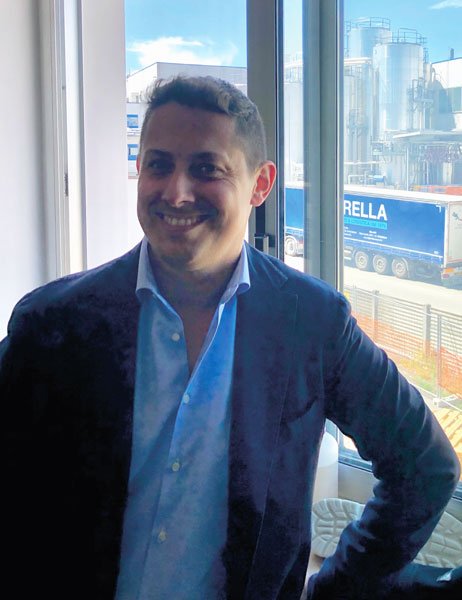Established in 2001 in Vigevano, Elachem S.p.A. is specialized in the production of polyurethane systems for several sectors, mainly for the footwear industry.
Over the last few years, the company has chosen to widen its scope of action by implementing a plant for the manufacturing of saturated polyester resins, designed by the in-house R&D department. A successful growth that has helped the firm become a market leader, featuring an annual output of approximately 50,000 tons as well as a worldwide network of satisfied customers. Elachem’s flagships are the state-of-the-art laboratories, thanks to which the staff can take care of the whole production process, from the design to the testing phase.
We met with Marco Valieri, Sales manager, and we asked him to tell us more about his experiences and about the latest innovations developed by the company in the post-pandemic context.
Marco Valieri, let’s talk about your professional training and background.
I worked for over 15 years for another manufacturer of polyurethane systems, where I ended up holding different roles, starting with the technical development of footwear materials. I acquired a sound technical know-how thanks to an ample range of experiences, sometimes living abroad for long periods, and I took on various tasks and responsibilities. After that, I spent five years in Russia, where I dealt with the local market and with the neighbouring countries (CIS). Later on, I worked at Celanese (former SO.F.TER) and then I chose to focus once again on my first passion, polyurethane, thus joining Elachem in 2019.
As for Elachem, what are the most topical issues?
With regard to the Elachem and Epaflex group, the main source of interest lies in the footwear industry, not only in the fashion sector, but also in safety shoes, either assembled or injected. More specifically, the safety branch has been experiencing a steady growth and evolution, as workers employed in different professional contexts wear these models for several hours a day. Hence, the need for greater comfort, wearability and aesthetic care. Our systems perfectly meet these requirements.
Research and development: two key assets investment-wise for the whole sector. What are the most interesting trends?
Product-wise, lightness and flexibility are undoubtedly in high demand. A fairlt widespread trend, even in the safety footwear sector. Therefore, we are striving to fulfil these needs and to provide a lightweight, elastic product, fully compliant with the current regulations and featuring top-notch properties. As for safety shoes, the key trend concerns a lower density for the mid-sole, 0.35, compared to the value, 0.42, used a few years ago. The Elachem team has already fallen into step with this requirement, a feat resulting in a significant weight reduction, the latter demanded by the most prominent footwear manufacturers. Besides that, we have been dealing with the development of new solutions based on highly innovative raw materials. Elachem and Epaflex’s main strength lies in their strong synergy: we produce polyesters in-house and we are able to manage the whole process. An unattainable result for the other competitors, often forced to purchase raw materials on the market.
Organic materials and circular economy are more and more in the spotlight. How do you manage the growing demand for sustainable products?
Our production facility is one of Europe’s largest sites for the making of polyester and this gives us the chance to implement further developments sustainability-wise, investing in organic materials. With the Epamat and Elapol BIO lines, we have launched a new range of materials, including, first and foremost, the classic TPU available in a bio-based version, featuring recyclable raw materials with a lower environmental impact. Even when it comes to the traditional two-component polyurethane, we can provide the single-density option, for mid-soles as well, and safety footwear material, boasting a percentage of organic components up to 70%, a striking result. Last but not least, we pay close attention to the requirements of circular economy and to materials scraps recycling. We are currently implementing a process aimed at reusing waste inside the clientele’s articles. For example, if customers purchase our polyurethane and do not manage to use it all, they can return to us the remaining part thanks to a specific give-and-take agreement. Said material can be recycled and partly re-used in the very same product developed by the customer, who can later take pride in its low-impact performances. When it comes to sole-making, high-end brands insist on aesthetically perfect items; however, this specific demand results in large production waste volumes: hence the need to recycle said scraps, so as to provide a quality, yet eco-friendly article. It is no longer a simple trend, as it was in the past: it is a new, widespread awareness, consumers are on the lookout for green solutions, conceived to meet these new market demands.
The pandemic has deeply changed the way firms interact with the clientele. Do you think that digital tools are set to replace physical contact?
I believe that digital solutions can become a key asset for the business, but I am equally sure that they will never replace face-to-face contacts. However, in my opinion, what may change is the role played by trade shows: considering the proneness to travel less, some exhibitions may lose their appeal. In this context, localized fairs are a pretty useful solution, a trend that has been gaining ground in the last 4/5 years: local players often have no desire to travel abroad to attend fairs and prefer to welcome buyers in their own district. Physical contact is essential, relying on local distributors that “knock on the doors” of the customers on a regular basis. Furthermore, if said professionals are not just mere sellers, but also have some technical skills, there can be some interesting benefits in terms of volumes and feedback.
www.elachem.com

Marco Valieri, Sales Manager Elachem SpA
